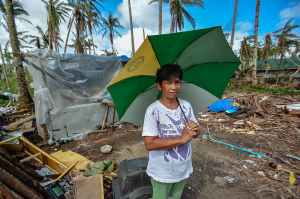I recently finished listening to the audiobook of your novel, Olga Dies Dreaming. As other audiobooks became available, and I wasn’t at all captivated with Olga’s occupation as wedding planner to the elite, I nearly dropped the novel. Napkin drama? How trendy and shallow can an author be? The stories of those who meander through lives taking little note of the world they walk through can be repulsive.
Yet, I kept reading. I’m glad I did. Your novel is layered with questions and meaning.
What changed my mind? For one, an unwillingness to give up on any Latina author, writing about two Latinos –puertorriqueño siblings in this case, particularly when the two are financially successful and live in privilege. For another, like many from the old neighborhood, Pietro and Olga grapple with the way achievement can separate us from our sustaining roots. Also, their family disorientation feels authentic (though created for the novel), and their concerns are ones most of us have.
Adding the political backdrop teased me in. While not a fan of strictly political books, I am an avid fan of fiction with a political backdrop. Novels that raise socio-political questions keep me reading. Consider The Bean Trees. Barbara Kingsolver fosters awareness on issues of immigration, indigenous trauma, and racism. And while some will dismiss such writing as divisive and manipulative, I truly appreciate the adept way Puerto Rico’s issues are woven into Olga and Pietro’s exploration of identity. A dissatisfaction with wealth, a call for attention to their own disintegrating neighborhood, and a tangled concept of liberation compelled me.
Intelligent novels are often more inspiring than what passes as news. One such mismanaged media example is when the spotlight should’ve been on what Puerto Ricans needed after a hurricane. Instead, cameras and talking heads highlighted Drumpf tossing paper towels to a beleaguered crowd in Puerto Rico. His actions so despicably clueless, if not absolutely incompetent, for someone of such rank made for cringe worthy reporting. And was a red herring distraction leading us away from the central point. Can news even reveal what’s important to know?
Perhaps it won’t be surprising to say that I’m most often the tune-out type; neither a disaster do-gooder nor disaster porn addict, yet left wondering how to be most helpful. Disaster news overwhelms and pushes me into a pit of darkness and confusion. The same thoughts and prayers, the same scenes, the same promises. In the case of P.R., little thought of the island inhabitants, except when hurricanes put them in the public’s eye, crossed my mind. Yet I’ve since learned about H.R. 8393, which offers P.R. the opportunity to vote for independence. The Senate hasn’t passed the bill, and maybe a letter can provide a tangible way to support P.R. You have my admiration for giving readers insights into the lives and struggle of Americans (yes readers, P.R is America).
Speaking of status and socio-political issues, the villainy of the Selby clan and their cronies was very satisfying. I love a good villain to despise, and their exploitive actions and entitlement made it easy to loathe them. While weaving in the people who manipulate politics seems an obvious choice, Dick’s hypocrisy (no spoilers here) diminishes him and minimizes the impact of those who want to and could possibly make a difference. Certainly, all of them propose a thwarted view of helping our fellow man.
Of course, everyone has dirty hands—even those who stand helplessly by (like I do) in a significant crisis. The main characters aren’t perfect. You are very clear that their mother, Blanca, isn’t either. Her manipulations remind me a bit of my abuela. While many mothers are guilty of manipulating their children, especially Latina ones, and I certainly have been told I can craft quite a respectable guilt trip, Blanca takes her desire for parental influence to a new level.
Most provocatively, Olga Dies Dreaming turns the usual matriarchal model of loving mother on its ear. But I admit, I was torn, wanting her kids to see her passion and commitment to improve life for their countrymen. Isn’t sacrifice for others noble? Aren’t parents supposed to want more for their children? She tells Pietro, that “even people who were once your sails can become your anchors.” Indeed, our hopes can tie down our children, and before they can live their dream, they will need to slip off the chains of expectation, and listen to their own hearts.
As the story continues, the missives from Blanca unfolds a disturbing view and an extreme impact of parental expectations. What’s even more brilliant (to me as a writer) is the use of this epistolary device which allows Blanca to remain distant from us, the reader, while echoing same in her relationship with her kids.
One last note on parental relationships, the siblings’ reaction to their mother helped me sort out some possibilities for my own story, including recognizing the role of generational trauma and my own desperate attempts to be considered worthy of my father’s attention.
In a branch of absent parents comes the family that still holds a place for Olga and Pietro. They are fortunate. And thus, the book holds a hopeful tone. While I appreciate my siblings for many things, when it comes to processing my father, they offer no shoulder. And as I reread all of my father’s poems and letters as a way of understanding him, so many questions remain unanswered, so much pain remains. Like these two orphaned adults, I’m trying to figure out where home lies.
Underlying discordant notes (of class, racism, imperialism, radical activism) are part of the whole picture. And along with origins and dreams, you remind us how these merits deep examination. We can benefit from hearing this music before we can realize true growth.
While little of this sounds light and funny, Olga Dies Dreaming traces an inevitable superficiality of the upper classes, and those that upwardly climb, all of whom forget the benefits from previous generations’ hard work and sacrifice. Of course, you make us laugh, if even squirm, at Olga and Pietro’s bumbling attempts to be comfortable with coveted success. And because both possess a strong need to be good and authentic people, yours is a fun read.
Final note for readers: the origin of the title. Olga Dies Dreaming led me to the work of Puerto Rican poet, Pedro Pietri best known for “Puerto Rican Obituary” in which writes about the sacrifices made to become someone else. “Puertorriquenos are a beautiful race” indeed.
Thank you. Pietri’s work is worth reading, and so is your book.
#letters_to_authors



